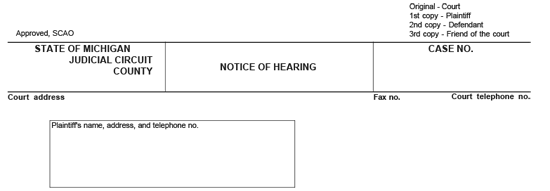
Partner, Divorce Lawyer
Contested Divorces in Michigan
You’ve likely heard the term “nasty divorce.” Nasty divorces usually involve disagreements between spouses on key issues such as child custody, property division, alimony, etc. In legal terms, when spouses cannot agree on one or more of these issues, the divorce becomes what’s known as a “contested divorce.” In other words, the dispute must be settled in court.
In contested divorces, both the plaintiff and defendant must retain legal counsel and present their case in front of a judge. In these cases, having an experienced divorce lawyer on your side can make a huge difference in the outcome of your case.
At Kelly & Kelly P.C, we have over 30 years’ of experience representing clients in contested divorce cases. Our attorneys have the knowledge and experience to effectively represent your interests in the Michigan’s family court system.
Common Reasons For Contested Divorces
A contested divorce typically results from disagreements on sensitive topics such as children, property, or finances. Obviously, these matters are highly personal and can lead to heated arguments and even irrational behavior. In some cases, the divorce may even involve a narcissistic or malicious spouse and become a high conflict divorce.
Here are some of the most common sources of disagreement among spouses.
Michigan Contested Divorce Laws
Michigan is a “no-fault” divorce state. This means that a divorce can be granted without the need to prove wrongdoing by either spouse. The most common ground for divorce in Michigan is an irretrievable breakdown of the marriage relationship, where there is no reasonable likelihood that the marriage can be preserved.
A contested divorce occurs when the spouses cannot agree on one or more key issues such as child custody, child support, spousal support (alimony), division of property, or debt allocation.
The process typically involves the following steps:
Filing for Divorce: One spouse (the plaintiff) files a Complaint for Divorce in the circuit court of the county where either spouse lives.
Serving the Complaint: The other spouse (the defendant) must be served with the divorce papers and given a chance to respond.
Temporary Orders: Either party can request temporary orders from the court for matters like child custody, support, or use of marital assets during the divorce process.
Discovery Process: This is an information-gathering stage, where both parties exchange financial documents and other relevant information.
Settlement Attempts: Before going to trial, parties are often encouraged or required to attempt to resolve their disputes through mediation.
Trial: If a settlement cannot be reached, the case goes to trial where a judge makes decisions on all contested issues.
Final Judgment of Divorce: The divorce is finalized when the judge signs the Judgment of Divorce, which outlines the terms of the divorce, including property division, custody arrangements, and any support obligations.
Contested divorces in Michigan can be complex, often requiring legal representation to navigate the various legal procedures and negotiations. Understanding these laws and processes is crucial for anyone going through a contested divorce in Michigan.
How a Contested Divorce Lawyer Can Help
Contested divorce lawyers play a critical role in managing the multifaceted aspects of divorce proceedings, especially when complexities such as high assets, child custody, and personal disputes are involved. They provide not only legal experience but also support and guidance through emotionally and financially challenging times.
Here are some key ways that a contested divorce lawyer can help.
- Navigating Complex Personal Dynamics – Our contested divorce lawyers handle cases where complex personal dynamics, such as narcissistic traits or mental health issues, play a significant role. We also have experience managing divorce cases impacted by substance abuse, focusing on solutions that address the safety and wellbeing of all parties involved.
- Financial and Asset Management in Divorce – Our contested divorce lawyers have experience handling substantial assets. This includes ensuring the equitable division of properties, investments, and other significant financial assets. If necessary, our attorneys will conduct detailed financial investigations to reveal any hidden assets or undisclosed income, ensuring a fair settlement.
- Litigation Skills and Trial Experience – Our divorce attorneys utilize our extensive trial experience to navigate the complexities of courtroom procedures in contested divorce cases. We have the ability to provide strong advocacy and representation, especially in cases requiring aggressive legal approaches.
- Emotional and Family Dynamics – The contested divorce attorneys at Kelly & Kelly P.C. offer guidance that takes into account the emotional aspects of divorce, especially in family-centric situations. This includes the negotiation and litigation of child custody and parenting time arrangements, prioritizing the best interests of the children. We employ our negotiation and mediation skills to resolve disputes amicably, reducing conflict and legal expenses.
Michigan Divorce Process
 In Michigan, when someone files for a divorce, the other spouse is served with a Summons and Complaint along with any other documents necessary for the divorce proceeding.
In Michigan, when someone files for a divorce, the other spouse is served with a Summons and Complaint along with any other documents necessary for the divorce proceeding.
Once the divorce papers are served, the defendant is required to respond to the summons within 21 days from the date of service if you were served personally (handed the papers) or 28 days from the date of service if you were served by mail or while you were outside of Michigan. If these deadlines are not met, a default judgement will be ruled against the defendant.
It’s the defendant’s responsibility to read the papers carefully and decide how they want to respond. The defendant may agree with the terms or disagree in which the divorce may become contested. You can learn more about Michigan’s divorce process here.
Cost of a Contested Divorce Lawyer
The cost of hiring a contested divorce lawyer in Michigan can vary significantly based on various factors such as the complexity of the case, the lawyer’s experience and reputation, and the specific geographical location. Here’s a breakdown to provide a clearer understanding:
Hourly Rates: Most divorce attorneys in Michigan charge by the hour, with rates ranging from $150 to $500 or more, depending on the attorney’s experience.
Retainer Fee: Upon deciding to hire a lawyer, you will typically need to pay a retainer fee. This upfront cost reserves the lawyer’s services for your case. In Michigan, retainers for divorce cases can range from $1,000 to $5,000 or more. This fee is then drawn down as the attorney works on your case.
Overall Cost Range: Considering these factors, the total cost of a divorce lawyer in Michigan can range from a few thousand dollars to tens of thousands, depending on the specifics of the case.
For example, at Kelly & Kelly:
- Initial Consultation: There is a charge of $350 for all family law consultations.
- Divorces with Minor Children: Retainers start at $6,500.
- Divorces without Minor Children: Retainers typically start at $4,000.
- Custody and Parenting Time: Retainers for these matters range from $2,500 to $6,000.
- Family Law Post-Judgment Matters: Retainers for these cases range from $2,500 to $6,000.
It’s important to note that these are general estimates and the actual cost may vary based on the individual circumstances of each case. Kelly & Kelly offers consultations to discuss specific cases, including a transparent discussion about fees and payment arrangements, which can provide a more tailored understanding of the potential costs involved in a contested divorce.
Frequently Asked Questions
Q. What is a contested divorce?
This is a situation where a divorce is contested where either one or both spouses dispute or disagree on an aspect of their divorce. This usually involves extensive legal fees and court time, as well as a considerably increased level of stress. Contested divorces are often known as a “nasty” divorce due to these factors.
Q. How long does a contested divorce take?
Contested divorces usually take a considerable amount of time, sometimes a year or longer. The length of time is dependent on what is being disputed, such as assets, child support or child custody. While most contested divorce cases settle, a handful actually go to trial which can extend the timeframe longer.
Q. What is the difference between contested and uncontested divorce
As the name may imply, the main difference between these two types of divorces is whether they are contested or they are able amicable to both parties. Contested divorces take a considerable amount of time and money to complete, whereas an uncontested divorce is a relatively quick process because it does not require a trial, discovery or other types of legal processes associated with a contested divorce.
Talk to a Contested Divorce Attorney
When filing for divorce or being served with divorce papers, it’s important to consult with an attorney who specializes in divorces within your state. Having quality legal counsel is important to ensure your rights are protected in family court. This includes receiving a fair portion of the division of assets/property under Michigan law, as well as ensuring fair judgement for issues related to child custody and parenting time.
Working with an experienced and knowledgeable attorney becomes even more critical when there are disagreements among spouses and the divorce is contested. In these cases, emotions run high and rational thought becomes more difficult. A lawyer who specializes in divorces understands the law objectively and will advocate for, and defend your rights.
If you’re going through a contested divorce in Michigan, our experienced team of family law attorneys are well equipped to represent you in court.
This page was legally reviewed by Ryan Kelly. Ryan has been a practicing family law and divorce lawyer for over a decade. Throughout this time she’s represented clients through various complex issues involving the family court system. This includes divorces, child custody, contested divorces, alimony, and more. She previously served as President for both the WLAM and the Women’s Bar Association and is recognized among the top 10 lawyers under 40 by the National Academy of Family Law Attorneys. She also contributes regularly to the Institute of Continuing Legal Education (ICLE) as a speaker on issues involving family law and child support.




